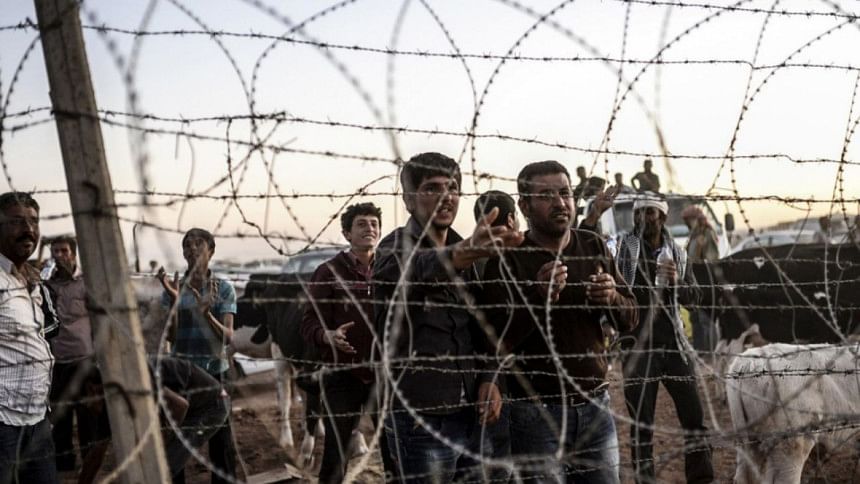An unmitigated humanitarian disaster

Syrian refugees are crossing the Aegean in a bid to get to Europe and safety. They are pouring in through Greece, Serbia and Hungary, and countries that make up the European Union (EU) cannot agree on what to do with this sea of humanity. EU foreign ministers are set to gather in Luxemburg on September 11 and respective member nations are sending their home ministers to Brussels on September 14 in a bid to agree on a long term mechanism to deal with the massive influx of refugees Europe is witnessing presently.
While governments mull and talk about what to do about the unprecedented arrival of so many thousands of people on their doorstep, the United Nations has urged for a single policy to be adopted. U.N. High Commissioner for Refugees Antonio Guterres stated, "Europe cannot go on responding to this crisis with a piecemeal or incremental approach. No country can do it alone, and no country can refuse to do its part."
At a time when the neo-right parties are on the rise in Europe, opening the doors to the Syrian influx is not easy for any European government. There have been clashes reported in Greece, which is witnessing the arrival of as many as 5,000 migrants and refugees on a single day. Last week, the city of Kos was the stage of an attack on a group of refugees by a violent group of nearly 25 people shouting "go back to your countries" or other such racial slurs. Coupled with the shift in politics and the economic depression that Greece has suffered for years, refugees could not have arrived at a worse time. But then Greece, like Hungary and France, are all merely stops on a journey leading to Germany, the country of choice for most Syrians.
Germany expects to open its borders to as many as one million asylum seekers. Although the media in that country has been generally sympathetic to the plight of refugees, there have been violent clashes. According to data released by the German interior ministry, there have been nearly 340 assaults on refugee shelters since the beginning of the year, which is a jump of nearly 100 incidents from that of 2014. Germany, the strongest economy in EU, is proposing a quota system that will be under discussion during the emergency summit due to be held on September 14. Ms. Merkel has lashed out at other member countries and the UK for refusing to share the burden of the intake. The quota system proposed by Germans has received less than a lukewarm response from countries like Poland, Czech Republic, Slovakia, Hungary and the UK.
With some four million Syrians displaced from their homeland since the beginning of the crisis in 2011, the UNHCR (UN's refugee agency) estimates that about 1.8 million have fled to Turkey, some 600,000 ended up in Jordan, and Lebanon, which has a population of four million, took in a million more. The rest are headed to Europe. European policymakers have much to ponder upon on September 14. A study by the Danish Ministry of Foreign Affairs titled 'The Syrian displacement crisis and a Regional Development and Protection Programme: Mapping and meta-analysis of existing studies of costs, impacts and protection', published on February 4, 2014 had the following to say in its Executive Summary: "In a region already hosting millions of Palestine and Iraqi refugees, the unprecedented scale of the Syrian crisis is producing immense additional strains on the resources and capacities of neighbouring governments and the international humanitarian system."
Amongst other things, impact assessments at various levels were done. Major areas of disruption for host countries included public health services, sharp rise in housing rent, a crisis in the labour markets and fluctuation of market prices for basic commodities and food. At the time of preparing the report, it was probably not thought that the "neighbouring countries" would witness a major shift from the Middle East to mainland Europe.
With no real end in sight to the Syrian conflict, there is major risk of Syrian refugees falling under the category of a "protracted" conflict, which according to UNHCR's latest Global Trends Report, means that the displaced Syrian populace may be in for a long period of forced displacement. This UN body's mandate is to help countries facing an influx of refugees. Apparently there are three categories: voluntary return or repatriation to home countries; resettlement to a third country; or integration into the host country.
As stated before, with the Syrian conflict increasingly looking "protracted," it is unclear when displaced Syrian citizens can return to their homeland. And with the economic downturn in the EU becoming a harsh reality, to what extent host EU nations would be willing to accommodate "integration" in a politically-charged atmosphere is open to speculation. What is and should be at the forefront of European politicians' collective mindset is that the tens of thousands of Syrian civilians have to be accommodated on the grounds of compassion. They did not choose to endure a harrowing journey through hostile territory with their children and their old to be turned away at the gates of Europe because legislation dictates it so.
The writer is Assistant Editor, The Daily Star.

 For all latest news, follow The Daily Star's Google News channel.
For all latest news, follow The Daily Star's Google News channel. 



Comments